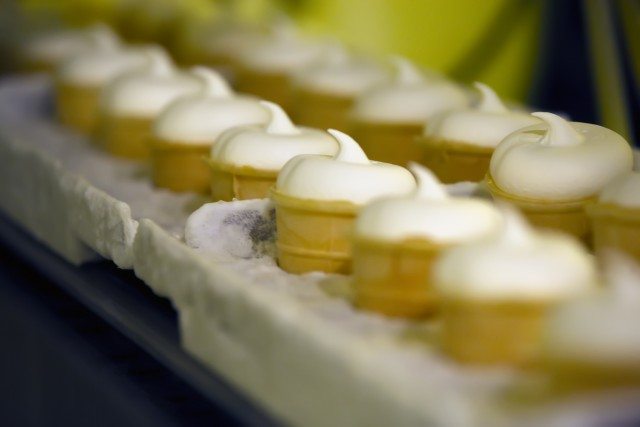From January 2015, every new horizontal chest freezer Nestlé buys to store ice cream will use natural refrigerants rather than synthetic refrigerants.
These new freezers represent 70% of the company’s total spend on freezers.
As well as helping reduce the company’s carbon footprint, they are also far more efficient for customers to run.
It plans to make all the freezers it uses more environmentally efficient by only buying those cooled by safe, natural refrigerants over the coming years.
Since 2013, Nestlé has been buying new horizontal ice cream chest freezers with natural refrigerants in Europe.
Fluor-containing coolants became commonplace in the second half of the last century.
Though non-toxic to humans, evidence emerged that they depleted the ozone layer and also contributed to climate change, so they are being phased out.
Instead, manufacturers are now turning back to some of the naturally occurring substances used in white goods until the 1930s, when the new synthetic alternatives first came onto the market.
These natural coolants include carbon dioxide, ammonia, water and air as well as hydrocarbons – like propane and iso-butane – which do not harm the ozone layer and also have no or a negligible impact on climate change.
Technological advances mean that these coolants can now be safely used in modern freezers, in models that use around half as much energy as those that were commonplace 10 years ago.
Global pledge
“Already, in 2013, Nestlé committed itself to buying only new horizontal ice cream chest freezers with natural refrigerants in Europe,” said Pascal Gréverath, head of environmental sustainability.
“Now, we are making this pledge global. This is the second stage in a wider process of making our entire fleet of freezers more environmentally efficient, cooled using natural refrigerants.
“These actions contribute to ensuring that Nestlé products are not only tastier and healthier but also better for the environment along the entire value chain.”
The company has invested CHF 250 million to implement natural alternatives in 93% of its industrial refrigeration systems.
Phasing out
The pledges are part of Nestlé’s aim to provide further climate change leadership.
These include its commitment to progressively phase out the use of high global warming potential refrigerants, such as hydrofluorocarbons or HFCs.
Nestlé is also implementing the Consumer Goods Forum Resolution on Refrigeration – which encourages businesses to take action towards phasing out some HFC refrigerants from 2015 – ahead of time.










